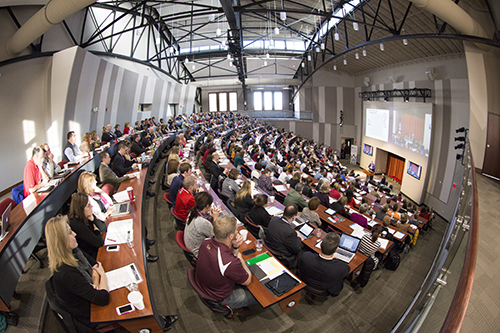
The Nebraska Summit on Math and Science Education brought together over 450 attendees from across the state of Nebraska to the Nebraska Innovation Campus on Dec. 8. Teams of administrators and teachers of math and science from K-12 schools, universities, colleges and state and district offices assembled to take stock of Nebraska’s strengths and the challenges that we face as we strive to ensure high quality math and science education in Nebraska’s K-12 schools.
The Summit opened with presentations by plenary speakers Matt Blomstedt, Nebraska’s Commissioner of Education, Diane Briars, president of the National Council of Teachers of Mathematics, and Jerry Valadez, director of the Central Valley Science Project in Fresno, California.
Blomstedt emphasized the need to develop sustained professional development and other support structures, which will equip Nebraska’s teachers to “support every student, every day.” Blomstedt also presented the Accountability for a Quality Education System, Today and Tomorrow (AQuESTT) framework, designed around six tenets on which strengths and needs of schools will be assessed with the goal on better teaching, not on more testing.
Briars followed with a call for identifying 21st century competencies to guide K-12 math and science education, and determining the best teaching practices that will lead us to them. Organizations charged with articulating these competencies all agree that American students need to become problem solvers, with cognitive, interpersonal, and intrapersonal skills. A way to begin this process is to stop teaching students tricks to arrive at answers and instead focus on teaching for understanding.
Valadez concluded the opening session by agreeing that teaching students to think and become problem solvers is vital for STEM education. In particular, Valadez emphasized the need to provide less-privileged children with opportunities to explore science regardless of socio-economic or ethnic background, so that all students can develop a high academic self-concept and a belief that they can be successful in STEM fields.
Following morning breakout sessions, lunch featured a presentation by Jim Spillane, Olin Professor of Learning & Organizational Change at Northwestern University. Spillane challenged participants to examine (and reexamine) organizational routines within schools and educational organizations to determine where changes, such as the designation of formal leadership, can facilitate interactions between teachers within and across school buildings and districts. Since subject matter knowledge is an important component of leadership, focused professional development can strengthen an individual’s role as a leader.
An afternoon panel on Creating and Sustaining PK-16 Partnerships featured Jim Lewis, Aaron Douglas Professor of Mathematics (UNL); Matt Larson, Lincoln Public Schools’ mathematics curriculum specialist and NCTM president-elect; Jim Harrington, Omaha Public Schools’ supervisor of mathematics; and Julie Thomas, Research Professor, Department of Teaching, Learning and Teacher Education (UNL). Panelists discussed the history of the partnerships among them, how these partnerships have led to successful programs such as NebraskaMATH, and the enormously positive impact the programs have had on education in the LPS and OPS school systems. Thomas brought the discussion to a close with the charge of using existing partnerships around mathematics as a model which science partnerships might emulate.
Closing remarks about the Summit were offered by Jon Pedersen, Professor and Associate Dean for Research in the College of Education and Human Sciences, and Carolyn Pope Edwards, Willa Cather Professor in Developmental Psychology and Child, Youth and Family Studies.
Breakout sessions at the Summit featured Nebraska State Senator Greg Adams, 2015 Nebraska Teacher of the Year Shelby Aaberg, Nebraska Department of Education Mathematics Director Deb Romanek, and numerous other esteemed stakeholders in STEM education.
A conference pre-session featuring sessions particularly applicable to K-12 math and science teachers took place at the Embassy Suites conference center on Sunday evening. More than 250 STEM K-12 teachers, practitioners and educators were in attendance.
Slides from the sessions at the Summit are posted online at http://scimath.unl.edu/conferences. Several presentations are up now, and more will be added next week.